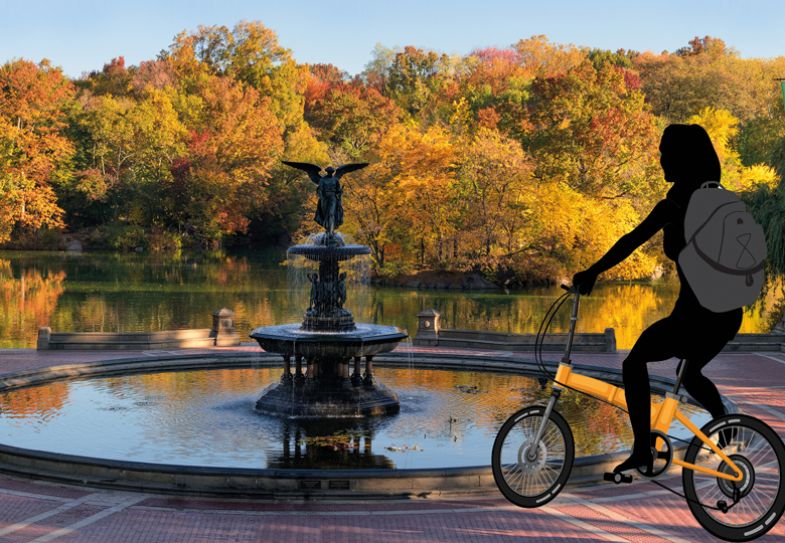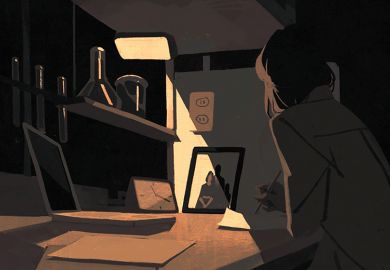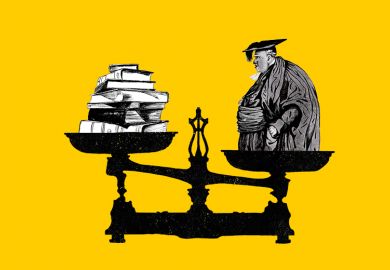Screen saver
No one bothered to tell me when I chose the specialty of anaesthesiology that it is not for the night owls of the world. With operating theatres generally starting between 7am and 7.30am, it is definitely a specialty for morning people. Given that I generally loathe getting up before the sun, early morning meetings, clinical rounds and lectures have always been the bane of my existence.
But, as of a year ago, I have a remarkable commute to work that has changed my attitude to early mornings. My apartment is on the west side of Central Park, and my office is on the far east side. To cross Manhattan, I have started cycling. I have become one of “those people” with a Brompton bicycle. I hop on to it at 6.30am, pedal a block, and then I have the most glorious ride into the rising sun through the park. Later in the day, on the return home, I dodge horse-drawn carriages, tourists and the full array of New Yorkers enjoying the greenery. But at that early hour, it is quieter, ghostlier, only peopled by exercise fanatics and fellow commuters.

Every morning, I pass what I always think of as the “Angels in America statue”. In the 2003 HBO miniseries, adapted from Tony Kushner’s play, the camera zooms over the Bethesda Fountain. Also called the “Angel of the Waters”, the statue is of an angel blessing the Pool of Bethesda, giving it healing powers. The statue was sculpted to mark the construction of the Croton Aqueduct, which brought pure water to New York City for the first time in 1842; it feels like a fitting reminder of the huge role of sanitation, and public health initiatives more generally, in reducing disease in cities such as New York. Moreover, given that Angels in America focuses on the Aids epidemic, the statue is also a reminder of the hope of remedies for the seemingly incurable.
When I reach work, it is a new initiative that is the most exciting part of my week. We have a research meeting that is designed to bring together members of the clinical department who are also engaged in research. In an age of ever-increasing technology, with ubiquitous Zoom meetings, and with even patient care involving so much time staring at a screen, this new meeting is a throwback to another way of life. The discussion is based on what someone prints on a piece of paper, with enough copies for all.
Controversially, we have no remote option. I am aware of the downside of this choice, the people who may be excluded because of that lack of flexibility. But what it has meant is that the meeting – with 10 to 15 people – occurs with no screen at all. The first one felt like a revelation. I couldn’t remember the last time I had sat down at a table with a bunch of colleagues and not had any need to look up at the screen looming at one end of the room or the laptop in front of me. The absence of that very slight lag in conversation as you wait for the connection to catch up with the words; the lack of any need to strain to hear someone who is slightly garbled; the ability to look, naturally, around a room and see friends and colleagues: it all amounted to the most exciting experience I’ve had at work in a long time.
For me, our morning meeting is a reminder of an earlier time in my career. For many younger colleagues around the table, it is most likely closer to a portal into history. But while Zoom was a lifeline for those who had the majority of their training during the Covid years, it was also a soul-sucker.
To fully sever that screen connection even for an hour will, I hope, help to restore the sense of human connection that we all need to get up in the morning and come to work, whether on a train through a subway tunnel or on a bike through Central Park.
Hannah Wunsch is professor of anaesthesiology and vice-chair of research at Weill Cornell Medicine’s department of anesthesiology.
Social enterprise
Every day, at 8am, a Zoom meeting opens. It’s done so for years, whether or not someone is present. A core group of colleagues and friends gather in its windows. We chat a bit about how we slept, the state of our backs and what we plan to work on that day. Then we raise our coffee mugs and get to it.
I started this recurring writing hour during the pandemic lockdown. It was not an original idea: at that point, it seemed everyone involved in writing was finding ways to meet virtually. I heard about a free online co-writing hour out of London run by Parul Bavishi and Matt Trinetti. The London Writers’ Hour would go on to become a massive undertaking, running in four time zones every day. I had a weekly Zoom every Monday with a group of women I’d met in a creative writing class, also online. But what I longed for was a co-writing meet that would get me to write every day, ideally right after my son left for school. I also wanted it to be small enough that I felt I owed it to the other participants to use my time well.

That combination turned out to be golden. Our “8am Club” has become a place where we work on projects small and large. Sometimes, we cheat by doing course prep or the most urgent admin, but usually we chip away at the work that’s hardest to make time for in an academic career: research and writing. Even when our day is full of other tasks, spending one hour on our own work gives us peace of mind. Because the group is based on personal connections, it’s also become a daily support. We might share our journaling practice, give physiotherapy tips or talk about career issues. Sometimes, after the writing is done, a few of us will stay in the meeting to chat about a work-related question, though we never do this before we’ve put in our hour.
Perhaps the most important part of it is that it makes a fundamentally lonely enterprise into a social one. As most academics and writers know, it is hard to keep working on long-term projects. The gains are so small, almost invisible: a footnote expanded, a paragraph reworked, a few definitions made more precise. It is hard to appreciate how important these tiny steps are when climbing what feels like a mountain. So the “8am Club” celebrates progress, no matter how minuscule it feels.
A while after beginning our writing hour, I went to Toronto for a year-long fellowship. I was now in a different time zone from my usual group, so I began another hour there, though a little later to adjust to local school times. One of our regular attendees was a Vermont man I knew from Facebook and a couple of in-person meetings, Tomás Kalmar.
Tomás was about 79 years old at the time, with a long and varied career behind him as an activist and community worker, an expert in bilingual education, and schoolbus driver, among many other roles. He also had a great unfinished quest. He’d stopped his graduate work in medieval history at Harvard 50 years earlier, and still dreamt of publishing his magnum opus on Alfred the Great. Day after day, after our writer’s hour, Tomás shared his joy in the work: how he was reimagining the book’s structure, how he’d revised a few sentences, how he’d come to understand something new about his subject. Tomás finished his 50-year project in that online space: King Alfred the Great, His Hagiographers and His Cult: A Childhood Remembered was published by Amsterdam University Press last year.
Back in Germany, my friends had taken over the administration of the writing hour, and come up with other good ideas to supplement it. One February we booked rooms in a monastery in Bad Wimpfen, a small southern town on the river Neckar. We had a small library to work in, and we enjoyed, for one long weekend, the best kind of monastic existence. The refectorium provided our meals, we wrote hard all day, took a walk by the river in the afternoon, and drank local wine in the evenings. Some of us even attended services. It was just the right amount of time to get a chapter off the ground, or to push a project to the next stage.
This past year, I had to relearn the value of the 8am Club. For months, I had stopped attending. I was mourning the loss of a close friend, travelling too much, and dealing with the resulting health problems. At some point I even forgot the hour existed, although my fellow writers were still meeting daily. It was, unsurprisingly, not a good time for my writing, which felt fragmented and rushed.
When I complained about this state of affairs, one of my colleagues reminded me that the writing hour was still on. I sheepishly logged in a few days later, and immediately remembered the sense of calm I’d always enjoyed, the focus which, if not inevitable, was so much easier to attain with a group of like-minded people. And although this semester is turning out to be as busy as any other, the words are, finally, piling up again.
Irina Dumitrescu is professor of English medieval studies at the University of Bonn.
Critique of pure Nespresso
“Win the morning and you win the day,” proclaims Tim Ferris, the Bear Grylls of the self-help productivity movement. I hope so because I have become a wannabe member of what has been called the cult of 5am or, more kindly, “The 5am Club”.
Waking at 5am is popular with the celebrity ultra-high-net-worth individuals and the Silicon Valley brotherhood. For example, American actress Gwyneth Paltrow’s daily routine, according to her social media posts, involves waking at 5am for a 30-minute tongue scrape and Ayurvedic oil pull, followed by some transcendental meditation and a dance workout.
In theory, the advantage of getting up so early is that your cognitive bandwidth is at optimal capacity before it gets clogged up with the demands and hassles of the day job. You also have the solitude and quietness, which allows the space and time to get on with some deep work, as Cal Newport, the American academic, podcaster and time management guru, would put it. In my case, the aim is to make meaningful progress on the types of academic writing that are often crowded out during a typical workday by teaching responsibilities, departmental meetings and, inevitably, email.

Trying to cope with the normal routine demands of an academic job while trying to progress labour-intensive scholarship is the bane of most working academics. Navigating these time pressures and demands has emotional consequences – aptly documented by Liz Morrish’s 2019 Higher Education Policy Institute report, Pressure Vessels: The epidemic of poor mental health among higher education staff.
In theory, this early-morning routine allows me to carve out mental space and alleviate the time pressures that build up as the day goes on. Maybe the tagline of Robin Sharma’s bestselling self-help book, The 5am Club, is true: “own your morning, elevate your life”. Or as one reviewer of Sharma’s book put it: “If time is money and health is wealth, then the 5am Club is definitely worth joining.”
The reality is that although I can get up fairly well around 5am, I am not really a morning person – or a mid-morning or late morning person for that matter. Before I can get down to those important tasks that my cognitively refreshed mind is eager to take on, I have to consume at least five peanut and roasted sesame Nespresso coffee capsules (despite the 10-capsule pack being intended to last a week). Caffeine really is the cheap(ish) amphetamine of the masses.
Eventually, I sit down and, after a few YouTube videos, attempt to get some serious work done. However, I’m soon reminded of the urgent email replies and administrative tasks still looming from yesterday – or, more realistically, from the previous week – that I’ve been procrastinating over answering.
In fact, having gone to the effort of dragging myself out of bed at 5am, I often find that much of the hallowed early morning is hijacked by tasks that give the illusion of productivity without contributing significantly to progressing things that seem important but often get crowded out, like maybe doing some research writing.
After practising this early-morning routine for some time, I’ve come to realise that it’s time to ditch the tongue scraping and the relentless quest to “own the morning” to “elevate my life”. Even attempting to respond to unanswered emails or write a few sentences for a research paper can feel futile or disconnected. Instead, the most productive thing I can do as part of my early routine is, quite simply, nothing – perhaps just thinking or reflecting. The unlikely 5am guru who led me to this epiphany is the 18th-century German philosopher Immanuel Kant.
Kant’s mornings began at 5am, roused by his manservant Martin Lampe, a retired Prussian soldier, who would call out in his best military voice, “Mr Professor, the time has come.” Lampe had strict instructions to be persistent, as Kant often struggled to rise early. Once awake, Kant would drink one or two cups of weak tea while smoking a pipe. This solitary pipe-smoking session was reserved for thought and meditation, although it was said that the size of his pipe bowls grew significantly over the years. After finishing his ritual, Kant would prepare for his lecture, which started promptly at 7am.
This was Kant’s routine for much of his professional life but especially during his so-called silent decade between 1770 and 1781 – when he produced no published works and did nothing but smoke his pipe, think, teach and go for afternoon strolls.
At the end of his decade of silence, Kant began work on the Critique of Pure Reason – a self-proclaimed Copernican revolution in philosophy. He completed the Critique in a five-month writing frenzy, but this seminal work was a result of his 10 years of quiet thought labour.
In modern academia, where networking, doing and being prolific are prized virtues, quiet solitude and idleness are much overlooked and underrated. Perhaps it’s time to trade in my Nespresso machine for a large Calabash Bent Blakemar pipe, instead.
Michael Marinetto is a reader in management at Cardiff University.
Register to continue
Why register?
- Registration is free and only takes a moment
- Once registered, you can read 3 articles a month
- Sign up for our newsletter
Subscribe
Or subscribe for unlimited access to:
- Unlimited access to news, views, insights & reviews
- Digital editions
- Digital access to THE’s university and college rankings analysis
Already registered or a current subscriber?








